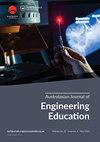Towards a descriptive framework of the engineering ethical worldview
Q1 Social Sciences
Australasian Journal of Engineering Education
Pub Date : 2021-07-03
DOI:10.1080/22054952.2021.1940736
引用次数: 1
Abstract
ABSTRACT This paper provides a novel theoretical framework of engineering ethics, specifically how engineering professional practitioners make sense of ethics. Multiple regression was applied to 2009 survey data (N=2276, 38% return) of practising engineers, to identify groups of competencies correlated with ethics. These were identified as values within an ethics worldview model. The model has two compartments. One is the development of a professional worldview, whereby professional engineers reconstruct their own values over time, and then seek to embody those in their own life. The other is an awareness of the need for professional judgement in complex decision-making. All the significant variables identified in the survey may be accommodated in this model. While the raw data (ex 2009) were dated, the method and findings help move the field forward by providing new insights into how practising engineers make sense of ethics.构建工程伦理世界观的描述性框架
本文提供了一个新的工程伦理理论框架,特别是工程专业从业者如何理解伦理。对2009年执业工程师的调查数据(N=2276,回收率38%)进行多元回归分析,以确定与职业道德相关的能力分组。这些被确定为伦理世界观模型中的价值观。这个模型有两个隔间。一个是专业世界观的发展,专业工程师随着时间的推移重建自己的价值观,然后寻求在自己的生活中体现这些价值观。另一个是意识到在复杂的决策过程中需要专业的判断。调查中确定的所有重要变量都可以包含在这个模型中。虽然原始数据(2009年以前)已经过时,但方法和发现有助于推动该领域的发展,为实践工程师如何理解道德提供了新的见解。
本文章由计算机程序翻译,如有差异,请以英文原文为准。
求助全文
约1分钟内获得全文
求助全文
来源期刊

Australasian Journal of Engineering Education
Social Sciences-Education
CiteScore
6.40
自引率
0.00%
发文量
8
 求助内容:
求助内容: 应助结果提醒方式:
应助结果提醒方式:


